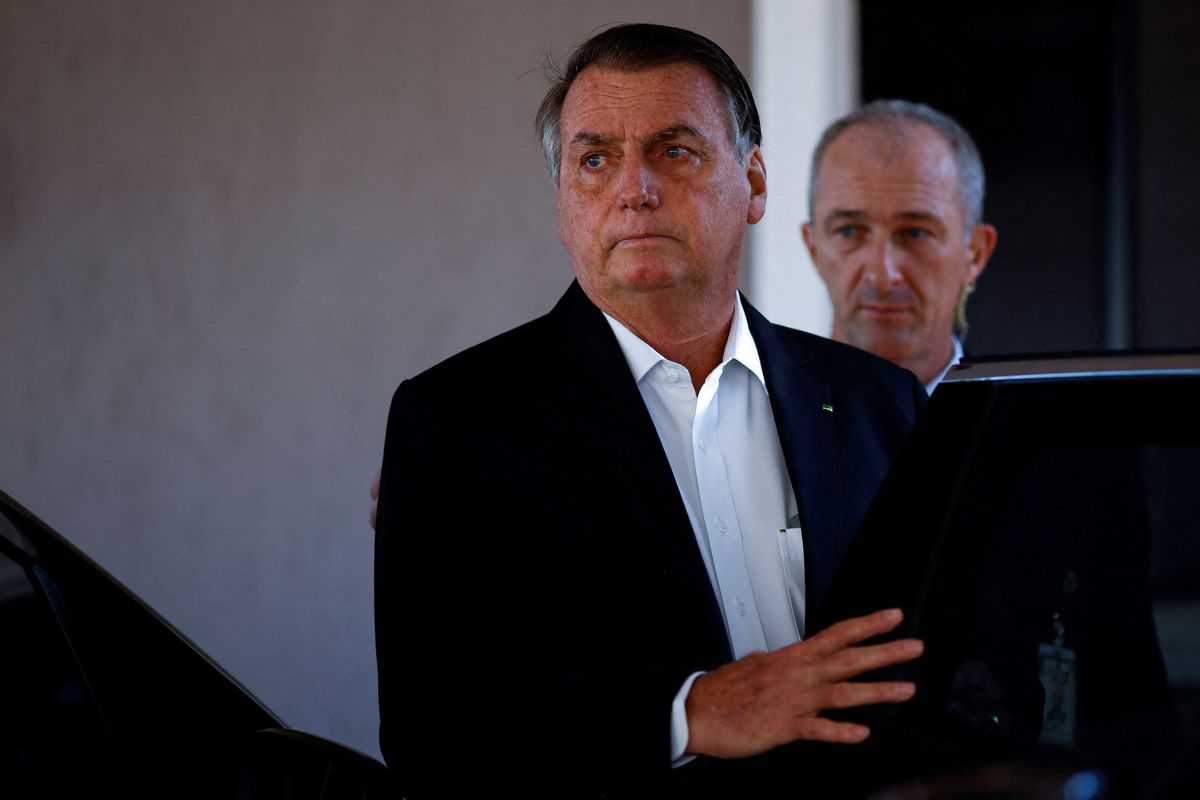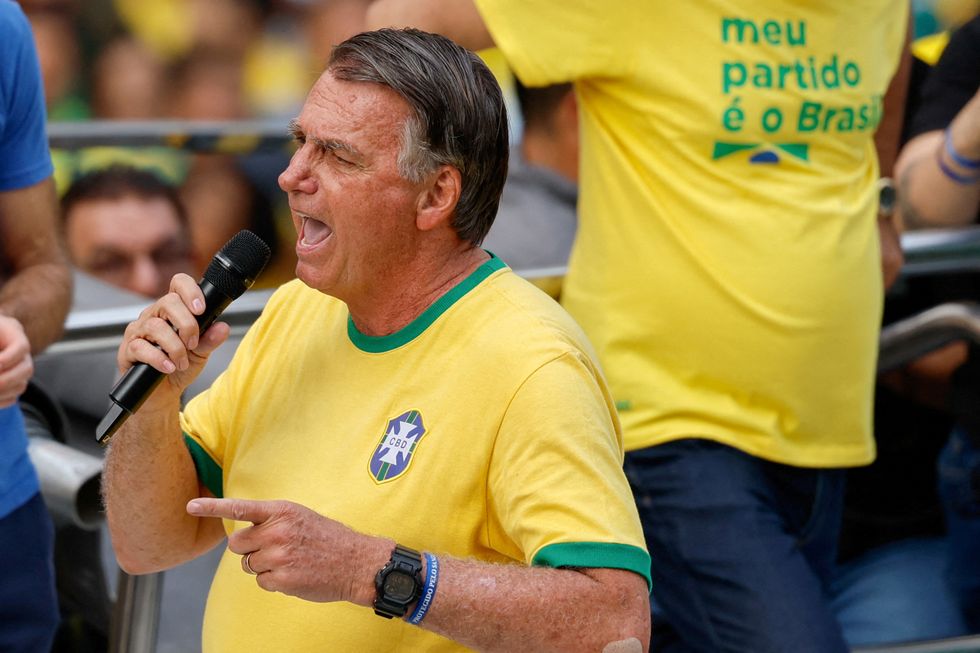Bolsonaro sidelined from Brazil's political scene as Trump enjoys resurgence
Former Brazilian leader banned from office until 2030 over election claims
Reuters
News Agency Partner
Reuters is a leading source of news and information, delivering fact-based reporting and expert analysis on international events and trends.

Former Brazilian President Jair Bolsonaro leaves his home following a search operation, in Brasilia, Brazil May 3, 2023.
Reuters
Brazil's electoral courts moved swiftly to punish Bolsonaro's attacks on voting systems
U.S. two-party system gives Trump more protection through Republican support
Brazilian Supreme Court united against Bolsonaro, unlike US apex court's stance on Trump
Police accuse Bolsonaro loyalists of plotting to kill or jail Justice Moraes
The political fortunes of Brazil's hard-right former President Jair Bolsonaro long mirrored those of his ideological ally Donald Trump - but their fates now look to have diverged dramatically.
As Trump prepares for four more years in the White House, Bolsonaro is barred from public office and could be tried before Brazil's Supreme Court next year after police accused him last week of plotting a coup.

For years, Bolsonaro followed Trump's tracks, first by mimicking his political style to win the Brazilian presidency with an anti-establishment campaign in 2018. When he lost a reelection bid four years later, he adopted Trump's playbook again, spreading falsehoods about the legitimacy of the results.
The reaction of the Brazilian politician's supporters was eerily similar to Trump's, with thousands of them vandalizing government buildings in the capital, Brasilia, on Jan. 8, 2023, hoping to overturn the results of the election that Bolsonaro lost to Luiz Inacio Lula da Silva.
Yet Trump is now back on top in Washington, untroubled by several court cases, while Bolsonaro is sidelined from upcoming elections and possibly cornered by three criminal investigations.
Bolsonaro has denied wrongdoing and accused investigators of being "creative" in the probes targeting him.
Night and day
The contrast between the former presidents' fates has hinged in part on starkly different tools each country has for holding politicians accountable, said Omar Encarnacion, a professor of politics at Bard College who has studied both cases.
"They really are night and day," he added.
Brazil's elections are overseen by dedicated courts with a mandate to punish politicians who abuse the electoral system. The top electoral court moved swiftly last year to bar Bolsonaro from running for office until 2030 due to his baseless attacks on the reliability of Brazil's electronic voting system.
No such court exists in the U.S., where elections are run by state and local officials under a patchwork of rules.
Even if Bolsonaro found a way to reverse the effects of the electoral court's ruling, as his allies have tried, a criminal conviction upheld on appeal would also stop him from running for president under Brazilian law.
In the U.S., a president loses the right to run again for office if impeached and convicted by Congress. The U.S. Constitution also states that anybody who is twice elected as president cannot run for a third term in the White House.
"The reach of immunity afforded to presidents in Brazil is a lot lower than what is afforded in the United States," said Eloisa Machado, a professor studying the Brazilian Supreme Court at the FGV law school in Sao Paulo.
Two-party system
Trump's grip on one of two major U.S. political parties has also shielded him from suffering greater consequences. Trump was impeached twice by a Democratic-controlled U.S. House of Representatives, but his Republican allies in the Senate held enough seats to acquit him.
"It's one party out of only two, it buys enormous coverage for Trump, quite in contrast to Bolsonaro," Encarnacion said.
Though Bolsonaro's right-wing Liberal Party has the most seats of any party in Brazil's Congress, it is one of more than a dozen parties represented, creating rival conservative power brokers. Liberal Party lawmakers have pushed legislation to reverse Bolsonaro's electoral ban, but many doubt their chances.
The compositions of the top courts in Brazil and the U.S. have also weighed on the former presidents' fates.
A Republican-appointed majority of justices on the U.S. Supreme Court ruled this year that many of Trump's actions as president were immune from prosecution.
By contrast, Brazil's Supreme Court has largely closed ranks behind Justice Alexandre de Moraes, who was appointed by Bolsonaro's conservative predecessor and is overseeing most of the criminal investigations of Bolsonaro.
Ivar Hartmann, an associate professor of law at Insper in Sao Paulo, said the range of political parties in Brazil makes the allegiances of its Supreme Court justices "more complex" and less predictable than in the U.S.
Looking ahead
Still, many of Bolsonaro's allies have vilified Moraes and questioned the basis for the judge to open and oversee investigations of far-right movements instead of waiting for prosecutors.
Even when Moraes himself has been the target of threats and attacks online, he has not recused himself from overseeing the investigation of those allegedly harassing him. Federal police working at the direction of Moraes say they have turned up evidence of plots by Bolsonaro loyalists to kill or jail the judge as part of plans to overturn the 2022 election.
While Brazil's legal system has allowed Moraes to steer hard-nosed investigations of Bolsonaro and his allies, his aggressive approach could eventually open cases to challenges if political winds shift - as they have before in Brazil.
Lula was convicted for taking bribes and barred by courts from running against Bolsonaro in 2018.
Within just a few years, however, as the mood in Brasilia swung and doubts grew about the impartiality of the judge who convicted Lula, the Supreme Court threw out the case against the leftist leader, citing procedural irregularities.
That ruling allowed Lula to run for his third, non-consecutive presidential term in the 2022 election.










Comments
See what people are discussing